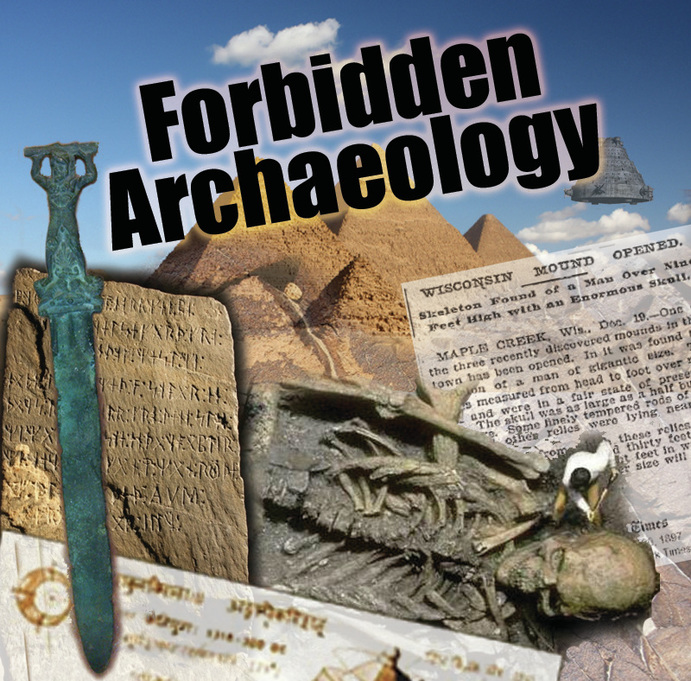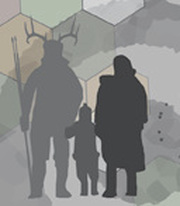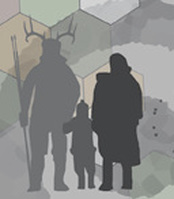
Course Organization
The course will be organized into four sections. We'll spend the first couple of weeks on background, discussing the characteristics of science and pseudo-science, the status of archaeology as a science, and why "getting it right" matters. Because this is a 200-level course with no prerequisites, it's going to be important to make sure the students have some general understanding of the tools we use to learn about the past and to discriminate credible from non-credible explanations. We'll explore the various motivations for creating narratives about the past and discuss the ways that pseudo-science attempts to masquerade as science while simultaneously trying to shelter it's ideas and "evidence" from the scrutiny that is fundamental to the scientific endeavor. Finally, we'll talk about how ideas and arguments are effectively communicated on the internet.
In Section 2 of the course, we'll be talking Giants. Readers of this blog know that this is one of my favorite topics. We'll start with some deep background, tracing the origins of western giant mythology through the Bible, Greek and Roman writings, and early European sources. We'll examine the origin and development of the fascination with giants in 19th century America and try to understand how the re-emergence of belief in the existence of "giants" fits into our world today.
The topic of Section 3 will be Ice Age Civilization. We'll trace the origin of ideas about an ancient, lost "mother culture" from Plato's description of Atlantis up to today, critically examining the idea that some high-tech civilization that was destroyed in a global cataclysm. We'll be looking at various pieces of "evidence" that are put forward to support this claim, and we'll be reading and reviewing portions of the book Species with Amnesia.
The final section of the course will look at claims for Transoceanic Pre-Columbian Contact, focusing heavily on proposed interactions between peoples in Europe and North America. We'll review the main claims for the presence of Europeans in the New World before Columbus and tie the origin and history of those claims to their current manifestations. How do we separate real pieces of evidence from hoaxes and misinterpretations? Why do some ideas persist despite a complete lack of objectively credible evidence? Why does it matter that we get this right?
Guest Participants
My plans to bring in some guest participants are moving forward. Jim Vieira will be visiting in September to talk about his experience investigating "giants." Scott Wolter will (hopefully) be coming in November to participate in the pre-Columbian contact section. I'm trying to raise money to offset the costs of flying both of these people down to Columbia: they are coming at my invitation to participate in a class that I'm setting up, so it is the courteous thing to do. Neither Wolter's nor Vieira's appearance constitutes an endorsement of their ideas on my part, and they both know that. Neither will be getting paid for his appearance. They are participating in, literally, an academic exercise: it's about showing students how to weigh the credibility of ideas by putting them into an arena where they can be challenged on the basis of logic and evidence. How do you phrase an idea in terms of a falsifiable hypothesis? What kind of information is required to prove something wrong? That's what we'll be asking all through the semester, and that's what we'll be asking of Wolter and Vieira.
I just started a Go Fund Me Campaign for Vieira's travel expenses this morning. The fund I set up to cover Wolter's travel expenses has been active for over a week now, but seems to have stalled out after a few donations. Thanks to those who donated! If you're excited about this class and what may come out of it, please consider contributing something (if you're able) to make this happen.
Finally, I'm happy to announce that Jason Colavito has agreed to participate in the course. I've asked him to talk to the class about his long history of online engagement with "fringe" ideas and explain how he gathers evidence and crafts an argument. I'm also going to ask him to discuss the history of ideas about Atlantis, as he has far more expertise there than I do. Thanks for agreeing to participate, Jason!
No, You Can't Visit -- Sorry!
Several people have asked (online and in person) about sitting in on the class during the guest appearances and/or me streaming them live somehow. Sorry, but my answer to that question has to be "no:" the course has to be geared to serving the students who are enrolled in it. Letting in spectators would be a slippery slope. I do hope, however, that the wider public will benefit significantly from the material that comes out of the class. The students will be writing blog posts that we'll put on a new website, and I anticipate that we'll be able to post some video content related to the guest appearances (those details will have to be worked out and agreed to by all parties).


 RSS Feed
RSS Feed
